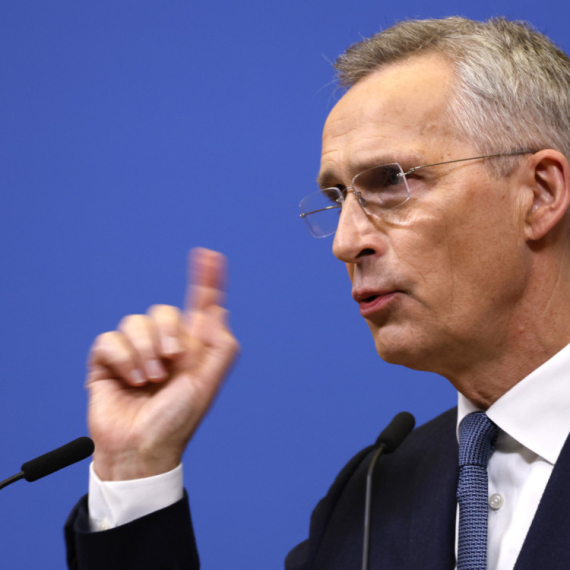Europe Day marked in Serbia
Europe Day is celebrated today to mark the beginning of European integration with the signing of the Schuman Declaration.
Friday, 09.05.2008.
10:05

Europe Day is celebrated today to mark the beginning of European integration with the signing of the Schuman Declaration. The Schuman Declaration, named after French Foreign Minister Robert Schuman, was an appeal launched on May 9, 1950 to place France, Germany and other European countries’ coal and steel industries under joint management, in spite the threat of a Third World War. Europe Day marked in Serbia The ultimate outcome of this initiative was the 1951 creation of the European Coal and Steel Community (ECSC), which included France, Italy, Belgium, West Germany, Luxembourg and Holland, the first of the European Communities and a precursor to the European Union. These six countries formed the European Economic Community a year later, which later grew into the EU. At an EU summit in Milan in 1985, it was decided that May 9 would be celebrated as Europe Day. The EU covers the largest common economic area, and is the largest political union in the world. It is one of the world’s most important economic forces, and has the largest gross national product in the world, with free trade of goods, people, services and capital. The basic impulses of European integration create peace, security, and economic and social solidarity. By signing the Stabilization and Association Agreement (SAA), Serbia has taken a step towards joining the family of European countries. “That question is legal-technical and political. Reforms must be implemented in all fields of life, and they have to be implemented for our own sakes. The process of EU integration is a voluntary process,” explains Vladimir Petronijevic of the non-government organization Group 484. He adds that Serbia must reach a consensus where European integration is concerned in order to accelerate the process. “If there is a consensus and there is a will, then we must work in an organized way on the necessary reforms. That road must be taken. When the legal and technical standards have been met, there has to be a political will in the EU for Serbia to become a member, which I think is unquestionable at this point,” Petronijevic says. Recognition of Kosovo independence and the deployment of an EU mission to the province that some parties in Serbia have tied to the integration process, and the deep political rift in Serbia, have not affected the country’s European orientation. According to recent research by the European Movement, some 83 percent of Serbian citizens want the country to join the EU. Even after signing the Stabilization and Association Agreement (SAA), an act that was presented as a betrayal, the number of citizens supporting EU integration has grown. “We asked how the signing of the SAA would affect Serbia’s future, the economy, and their families. The study showed that more than 50 percent of those questioned believe that there would be positive results from the signing in every area of their lives,” says Bojana Popovic of the European Movement. Events will be held all around Serbia today to celebrate Europe Day.
Europe Day marked in Serbia
The ultimate outcome of this initiative was the 1951 creation of the European Coal and Steel Community (ECSC), which included France, Italy, Belgium, West Germany, Luxembourg and Holland, the first of the European Communities and a precursor to the European Union.These six countries formed the European Economic Community a year later, which later grew into the EU.
At an EU summit in Milan in 1985, it was decided that May 9 would be celebrated as Europe Day.
The EU covers the largest common economic area, and is the largest political union in the world.
It is one of the world’s most important economic forces, and has the largest gross national product in the world, with free trade of goods, people, services and capital.
The basic impulses of European integration create peace, security, and economic and social solidarity.
By signing the Stabilization and Association Agreement (SAA), Serbia has taken a step towards joining the family of European countries.
“That question is legal-technical and political. Reforms must be implemented in all fields of life, and they have to be implemented for our own sakes. The process of EU integration is a voluntary process,” explains Vladimir Petronijević of the non-government organization Group 484.
He adds that Serbia must reach a consensus where European integration is concerned in order to accelerate the process.
“If there is a consensus and there is a will, then we must work in an organized way on the necessary reforms. That road must be taken. When the legal and technical standards have been met, there has to be a political will in the EU for Serbia to become a member, which I think is unquestionable at this point,” Petronijević says.
Recognition of Kosovo independence and the deployment of an EU mission to the province that some parties in Serbia have tied to the integration process, and the deep political rift in Serbia, have not affected the country’s European orientation.
According to recent research by the European Movement, some 83 percent of Serbian citizens want the country to join the EU.
Even after signing the Stabilization and Association Agreement (SAA), an act that was presented as a betrayal, the number of citizens supporting EU integration has grown.
“We asked how the signing of the SAA would affect Serbia’s future, the economy, and their families. The study showed that more than 50 percent of those questioned believe that there would be positive results from the signing in every area of their lives,” says Bojana Popović of the European Movement.
Events will be held all around Serbia today to celebrate Europe Day.
























































Komentari 10
Pogledaj komentare